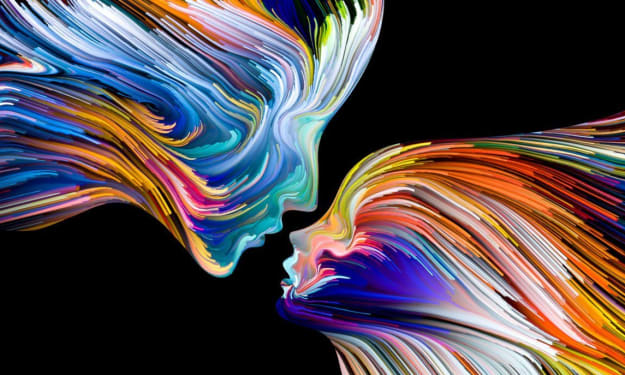Connection - The Soul's Purpose (Ch. 2)
Chapter Two - A closer look at separation.

The story in chapter one is a reflection of how what we observe externally is interpreted as in-congruent to the internal ever content heart. What we observe often does not 'look' like contentment 'feels.'
Trying to make something look how something feels is like trying to make something taste like the colour it is or trying to make something sound like how it smells... the senses are different and perform different functions... we don't ask that they give us something we know they cannot—we use a different one... when all the ones we have work together that's when we feel calm—it makes sense—it feels 'right'—it 'sounds' right...
The mind however is the only one that has consciousness—it knows there is an environment outside of itself so its mechanism of interpreting has to be through the filter of what I have called 'separation.' All of its perceptions are egoic—i.e., that it can independently function. So the ego can have... well... a big ego! But it also is imperative to stay alive... when we lose consciousness... well this state is known as death but if we lose any other sense, we don't die from that alone. So we need it and it can be excused for thinking it's the most important as it keeps us alive! Fair enough!
But if we interpret who we are and what we feel based on our conscious experience, then we are making assessments on what is and what happens outside of ourselves as the guide to how we feel.
Meanwhile down in the heart... just beating away, just connected to itself. No worries. Not consciousness. It just is.
If you will... imagine that your finger is not conscious, that it is a part of your hand. Your mind that is conscious knows that you have several fingers on your hand—but your finger is just connected. It knows nothing. It just is. Similarly the heart can ‘feel’ in the same way you may consider that the sensation of touch is ‘felt’ by your finger… but it is the mind that interprets the feeling—not the finger or the heart. The heart is just connected to itself, whole, complete, not conscious.
So our 'feelings' are responses to our environment that have been filtered through the conscious, separate and egoic mind. And our 'feelings' are most importantly created from the mind that is always deciding whether what has happened 'should' have happened; whether our circumstance is the same as others, what's different about us and our situations and using this evidence to create meaning...
I.e., 'I woke up this morning. It was dark and cold and rainy. Yesterday it was sunny and warm and I didn't need to wear my coat. Today I will need my coat and an umbrella. That's more to carry. I will need to take the bus, which will have lots of other people on it and there won't be anywhere to sit.... 'The mind might decide this is not as favourable as yesterday and therefore there is something wrong with today.' The evaluation that there is something 'wrong' produces the 'feeling' of disappointment or irritation or whatever... but the emotion is produced through the filter of the mind. The heart is still just beating away... fully connected to itself.
Another example... Frankie hit Susie. Susie felt physical pain. Prior to the incident, Susie felt fine. Now Susie feels the physical pain and her mind says there is something 'wrong.' The mind then decides that had Frankie not hit Susie then nothing would be wrong. The mind does not want Frankie to hit Susie again, and in its association between the two things looks for evidence as to why it happened so as to stop it happening again. Susie's mind decides that Susie must have done something to cause the event and remembers she was being rather loud just before it happened. The mind tells Susie she can avoid physical pain if she is quieter. Susie believes now that there is something 'wrong' with her which filters through the mind as the feeling of sadness, or that she is a fool and also takes away a tiny piece of her self worth. (Obviously this isn't the only assessment the mind could make. It could create the feeling of this incident being unfair and result in Susie hitting Frankie back or other assessments creating other feelings and behaviours.)
The point is it is the mind that creates the evaluation and assessment by finding other evidence from experience or in the environment presently and translates it into a feeling. Our hearts do not produce new or different feelings. The heart is always connected to itself and knows its value regardless of the environment. All our minds are made up of different experiences and we all have different environments so the assessments will be different too and the resulting behaviour and feeling...
Why does this matter? It matters because it is only the mind that is in a state of in-congruence. The state of in-congruence or non-alignment is from the awareness of separation.
So we can't help thinking there is always something wrong. With us, or someone else, or our situation, or our circumstance or how we feel... the list goes on...
When we are very young, we are more likely to assume that what is wrong is us. That we were faulty or not good enough. I.e., if you were abandoned, rejected, abused, and even if you weren't but there was any regular minor assessment you made about your environment... you will probably have quickly assessed that something was wrong with you. These incidents make up our experience and are stored as data in the mind so when anything happens as we get older, the mind uses it as further evidence and again it translates it into feelings. If those feelings have been compounded over the years (which they have by all the assessments the mind has made concluding from its past experience as well as its current environment), you could be living in a full time state of separation from yourself.
I think most of us are.
The story in chapter one tells of the attempts the mind makes to find evidence to the contrary too (because lets not forget the mind is not working against you—it's just taking data and experience and translating it from the outside in). The mind looks outside and finds ways to improve the inner state. These are what I mean by 'attachments' I describe in the story. We find stuff from outside and bring it in... but these sadly can only ever be temporary.
A flower can grow beautifully and take in sun light and water to help it grow, but it needs to remain fully connected to itself in order to continue to grow. If you pick the flower, you can put it in a vase with water and sunlight, but without it's source connection it will only be a temporary pleasure. It will die without its connection to itself. And yes it is important to note it could die without the right environment too, but those are factors to growth—it cannot remain alive without remaining connected to itself first and foremost.
The ever content and connected heart just beats. It goes on beating because the source of its power is itself. It doesn’t need to plug in to a socket for power. The source of its power is in its state of connection to itself. It is connected-ness. It just exists. It just is.
The mind of separation will go on looking outside and seeing separation. It will go on assessing something is 'wrong' and it will go on offering ways to put it right. But they will all be plug-ins, and so there is no connection to source power. So they will always be temporary and you will always need to find more to sustain power. The source of our power is merrily beating away inside your body—completely oblivious, calm and connected.
That state of connectedness is where we find who we really are beyond what we see outside of ourselves. This is where nothing went wrong. This is where we find that nothing is wrong or ever was wrong with you. Everything you think about yourself and your situation was found through the eyes of the separated mind that translated it into a feeling that you think came from your heart.
Let's go there now—into connected-ness and find out whats there... in chapter three.





Comments
There are no comments for this story
Be the first to respond and start the conversation.